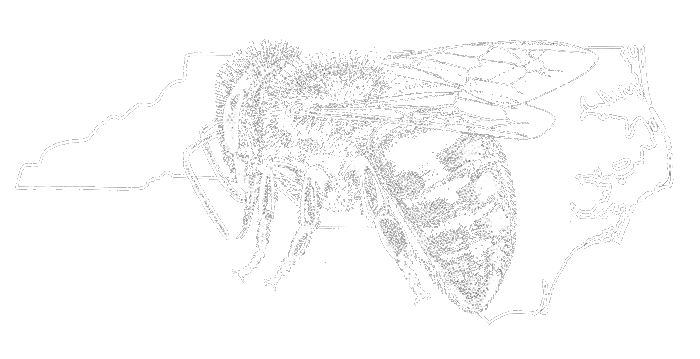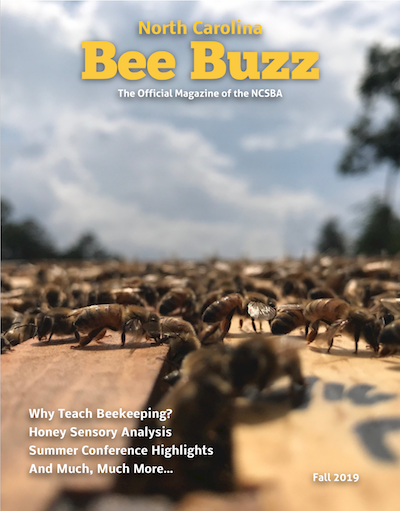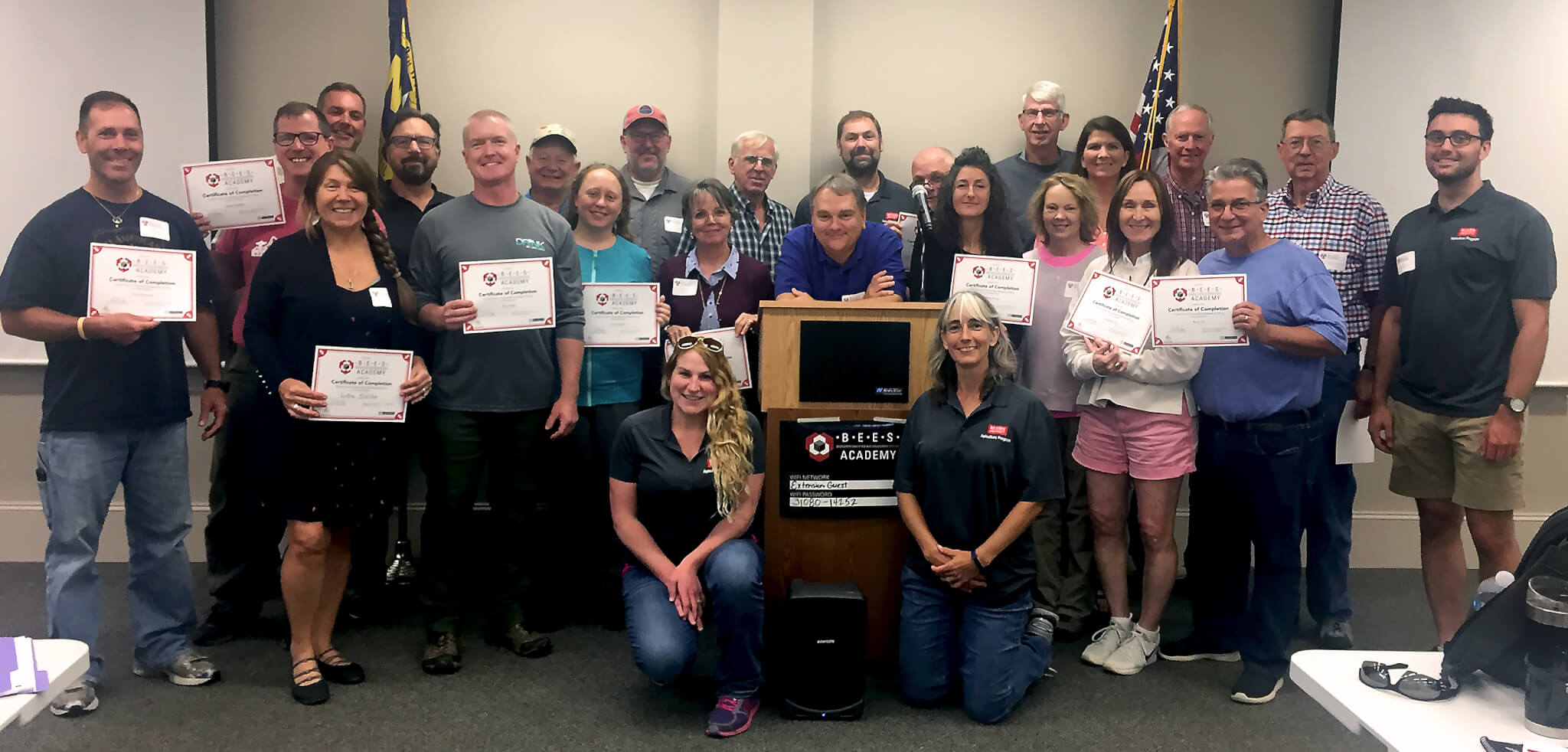The Fall 2019 Bee Buzz is now available. Highlights include Summer Meeting Highlights, Why Teach Beekeeping and Honey Sensory Analysis in the US.
News
BEES Academy Report
NCSBA members enjoyed learning and spending time with Dr. David R. Tarpy August 23th and 24th at the Caldwell County NC Cooperative Extension office as he debuted his new intermediate beekeeping lecture series, The BEES Academy. The class was a great success thanks to the extra efforts of Seth Nagy, Tina Lovejoy, Diana Ford, Ron and Elizabeth Cifu, Lewis Cauble, and the NCSU Volunteers. If you are interested in joining in this educational experience, spots are still available for the sessions at Brunswick and Chatham County. Please visit https://www.ncsuapiculture.net/bees-academy-home for more information and to register!
NCSU Apiculture BEES Academy
Are you a beekeeper with a number of years of experience who wants to increase your understanding of bees and improve your practices? Do you feel like you might need a “booster shot” to update what you learned in your beginner bee school? Wish there was an opportunity to reinforce your experience to maximize your beekeeping success? If you answered yes, set aside two full days and immerse yourself in theoretical and practical aspects of beekeeping at the first ever BEES Academies. During live and pre-taped videos from the Beekeeper Education & Engagement System (BEES), Dr. David Tarpy, other members of the NC State Apiculture Program, and CES instructors will help you build upon your current knowledge of beekeeping by exploring topics such as:
- Honey bee anatomy
- Division of labor & bee behavior
- Queens, drones, and mating
- Diseases, parasites, and disorders
- Varroa Integrated Pest Management
- Advanced management techniques
- Africanized honey bees (*substituted by a lecture on Bee Plants in Piedmont session by Debbie Roos)
- Effects of pesticides
- Honey and other hive products
Each presentation is roughly 30-60 minutes and will be followed by a short Q&A and Discussion period. On the second day, you will have the opportunity to practice and observe important areas associated with bee management, including: Hive products, How to read a pesticide label, Diseases under the microscope (Mountains and Piedmont only), Monitoring for varroa mites, Nutrition and supplemental feeding, Identification of native bees (Coastal Plain only). Three instances of this course are being offered in three separate regions in North Carolina (Mountains, Piedmont, and Coastal Plain) and at different times during the Fall of 2019, so register for the one most convenient to you. Space is limited to the first 100 beekeepers at each event, so be sure to register early! Further information and links to online registration through the NC State REPORTER system can be found at: https://www.ncsuapiculture.net/bees-academy-home
Sincerely, the NC State Apiculture Program

NCSU Field Honey Bee Laboratory Update – NC Senate budget
Dear Members:
We are one step closer to achieving our longtime goal of building a new field honeybee laboratory for the North Carolina State University Apiculture Research Program.
That came this week when a $2 million-dollar appropriation for the project was included in the North Carolina Senate budget proposal.
This is not the end of the matter, however. The Senate Budget must be reconciled with the House budget, which does not include that proposed funding. Now we need your help once again. Please contact local your General Assembly Representative and remind them how important honeybees are to our economy and the environment. And specifically ask the to push their leaders to keep the Bee Lab Funding in the budget.
Your calls and contact with your representatives were a major factor in getting this far. So, please keep working towards this goal.
Thank you for all your help, we’re not done yet. Your involvement and support are critical now more than ever.
Regards,
Paul Newbold
President, NCSBA
Certified Honey Producer Featured in Edible Asheville Article
Edible Asheville, a A seasonal magazine that tells the story of food and drink in Asheville and Western North Carolina, has a lengthy article featuring NCSBA Certified Honey Producers Doug and Sharry Mikell.
Celebrating the Sweetness of Sourwood by Chris Smith explains what exactly sourwood honey is, why it is special, and why it is so rare.
Do you know another Certified Honey Producer mentioned in the media? Let us know!
North Carolina State Fair, October 17 thru 27, 2019
Each year the NCSBA sponsors a Honey Booth at the state fair. This is a major fund raiser for the association and is one of the ways we are able to keep your dues as they are.
We depend on the membership to staff the booth on a daily basic. Their job is mainly to keep and inventory on display, sell honey, and honey straws. Simple enough, you would think, but last year we had to close down one day due to no volunteers. We’re starting early this year. Would your chapter like to commit to working the booth for a shingle day, covering all shifts for that day? This would be done on a first come, first served. Call or email me and I will block that day from the volunteer sign up that will be posted before the summer meeting. At the summer meeting I will be calling on member to sigh up for individual shifts for each day.
Extra points for the GAP program will be awarded to chapters that cover a day at the fair or for individuals that work work during the week at the fair.
Normal coverage is 3 people from 9 am to 9pm, with 1 addition from 12noon till 5 pm. The 9 am to 9 p can be divided into 4 or 6 hour work periods. Such as 9 to 1, 1 to 5 and 5 till 9. Or 9 am to 3 pm and 3pm to 9pm. This would be at the discretion of the chapter. Again, call or email to have your chapter cover any open day. A list will be maintained on the web of open days still available.
Before the Summer Conference the schedule will be posted for volunteers to sign up on line on a first come basic. We need you continued support to make this a success. Extra volunteers will be needed on Thursday the 17th, for setting up the booth and stocking inventory for the week.
Paul Newbold, President, NCSBA, beefarmer1349@gmail.com
Volunteer Availability
- Thursday the 17th, Wake County Beekeepers
- Friday the 18th, Coastal Plains Beekeepers
- Saturday the 19th, Beekeepers of Chowan County
- Sunday the 20th, open 9am to 9pm, 1 additional person not till 8pm
- Monday the 21th, Beekeepers of the Neuse
- Tuesday the 22nd, Tar River Beekeepers
- Wednesday the 23rd, 5 County Beekeepers
- Thursday the 24th, Person/Graville County Beekeepers
- Friday the 25th, Orange County Beekeepers
- Saturday the 26th, open 9am till 9pm, 1 additional person noon to 8pm
- Sunday the 27th, open 9am till 9pm, 1 additional person noon till closing
June is Cooperative Extension Appreciation Month
The following will appear in the summer 2019 edition of the Bee Buzz
The North Carolina State Beekeepers Association has officially declared
THE MONTH OF JUNE as COOPERATIVE EXTENSION APPRECIATION MONTH
The Smith-Lever Act of U.S. Congress established the Cooperative Extension Service in 1914, and the NC Agricultural Extension Service was founded soon thereafter operating in partnership with the state’s land grant colleges (modern day NCSU in Raleigh and NC A & T Univ. in Greensboro).
Two short years later, in 1916, N.C. State Extension and the U.S. Department of Agriculture reached an agreement and a beekeeping specialist was employed for the state of North Carolina.
On year later, in 1917, with the help from then Extension Beekeeping Specialist George Rea, the North Carolina State Beekeepers Association was formed, fulfilling an interest to do so that had been pervasive for over a decade. Two of the papers presented by Extension employees at that meeting were: “Beekeeping in Work of a County Agent” and “First Impressions in Beekeeping Extension”.
By 1918 educational courses on beekeeping had begun at what was then known as “The State College” (modern day NCSU). Following WWI beekeeping courses were offered to veterans as a means to help them get re-established on the home front. In 1982, Dr. John Ambrose, then “Extension Apiculturist” started a Master Beekeeper Program. Although budget restructuring forced NCSU to turn the MBP over to the NCSBA in recent years, Dr. Tarpy and his staff continue to support this integral program of our Association.
Because of Extension we continue to benefit from traditional presentations; webinars; the quarterly Wolfpack Waggle; information of advances from the Queen and Disease Clinic; opportunities to participate in research projects of students and staff; and receive news from the NCSU Apiary. We can even opt to take beekeeping courses online through the Beekeeper Education and Engagement System (BEES) so that members and public can access the courses from home.
Details of how to protect our hives before and following Hurricane Florence were emailed, posted on social media, and disseminated to county agents statewide so that all beekeepers could benefit from the research-based knowledge and experience of the collective state agencies.
Many of our chapters hold their monthly meetings at Extension facilities which frequently offer not only the space, but technical or event support and much more. Quite a few of our Chapters have apiaries at Extension facilities. We can call upon our Extension agents when we have questions about pesticides being used near our hives. We can network with local farming concerns through Extension.
From dealing with (then) new diseases of Foulbrood and Chalkbrood to current challenges concerning breeding viability and new pests, Extension has shared with us along the way.
It is clear to see that our two organizations have continued to grow side-by-side for over a century.
We share common missions.
The N.C. Cooperative Extension Service is our link to the many State agencies that provide us with ways to make our beekeeping better. For these reasons, the NCSBA has officially declared
THE MONTH OF JUNE as COOPERATIVE EXTENSION APPRECIATION MONTH
We hope that you will join in the Association’s efforts to show our appreciation.
Here are a couple of things you might consider doing:
Annually, the NCSBA recognizes one “Cooperative Extension Worker of the Year” with an award. The award is designed to reward and acknowledge efforts by the Extension workers on behalf of beekeeping, beekeepers, and the bee and honey industry in general. If you have someone you would like to nominate for this award, please see the NCSBA website for an application.
The Golden Achievement Program (GAP) of the NCSBA has added a category (E-4) and Chapters can gain points for participating in the NC State Cooperative Extension Appreciation Month.
NCSU Honey Bee Lab Progress
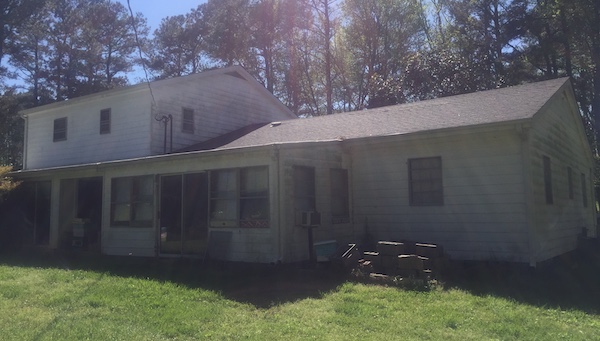
Attention North Carolina beekeepers,
Your help is needed to bring about a new honey bee research laboratory at North Carolina State University.
TO CONTACT YOUR REPRESENTATIVES, GO TO www.ncleg.gov
To the credit of Dr. David Tarpy, skilled professor of entomology and renowned researcher, NCSU has an outstanding apiculture research program. There are currently twenty-eight students in the program, including four doctoral and post doctoral researchers. However, this research is being conducted in one of the worst facilities in the University of North Carolina system. The program is housed in an old former residence that was constructed about fifty years ago. It has never been upgraded for safety, accessibility, security and bathroom facilities. The building continues to deteriorate. There is inadequate room for instruction, storage and research. To have more room, the back porch was closed in with reflective Styrofoam panels. In the basement lies the storage area; everything must be hauled by hand up and down the narrow wooden stairs. Overflow storage is outside, open air in the yard. The teaching classroom is in the former kitchen and dining area where long leak stains adorn the sheetrock ceiling. During rain showers, buckets are strategically placed in order to catch rain water that drips through the sheetrock. Representative Chuck McGrady toured the lab in 2018 and subsequently has declared that the building ought to be condemned. His statement is no exaggeration!
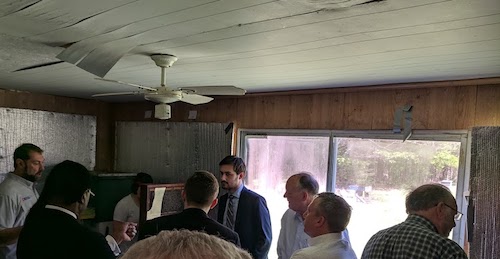
Key members of the General Assembly have taken notice of the need for a new honey bee research laboratory and are leading a major effort to secure the necessary funds (approximately $2 million) to build and operate a proposed new facility. NC House Bill 334 (full text here) introduced by Representative Chuck McGrady and has three additional primary sponsors, Representatives Mitchell Setzer, Pricey Harrison and John Ager. Twenty-five other members of the house are sponsors of the bill. HB 334 enjoys the support of both parties. Most recently, Senator Brent Jackson and Representative John Ager toured the lab and concurred that the facility should be replaced. Please contact your local members of the General Assembly and voice your support for House Bill 334.
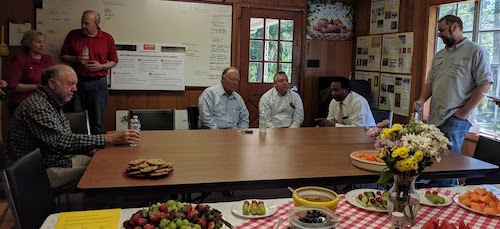
Take a look at the following photos of two other state university bee lab doing comparable research. There are the recently constructed honey bee laboratories at University of Minnesota ($4.5 million) and the University of Florida ($6.4 million), then the honey bee lab at North Carolina State. The disparity in investment and facilities is profound. The pictures speak for themselves. – Rick Coor
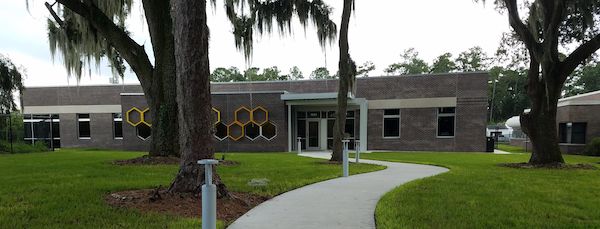
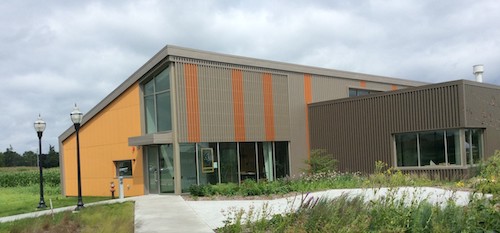
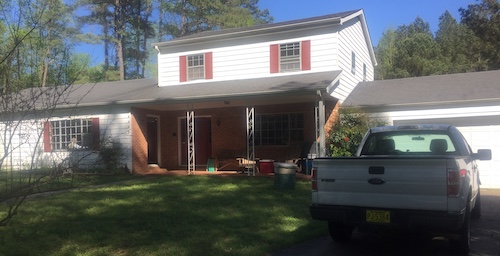
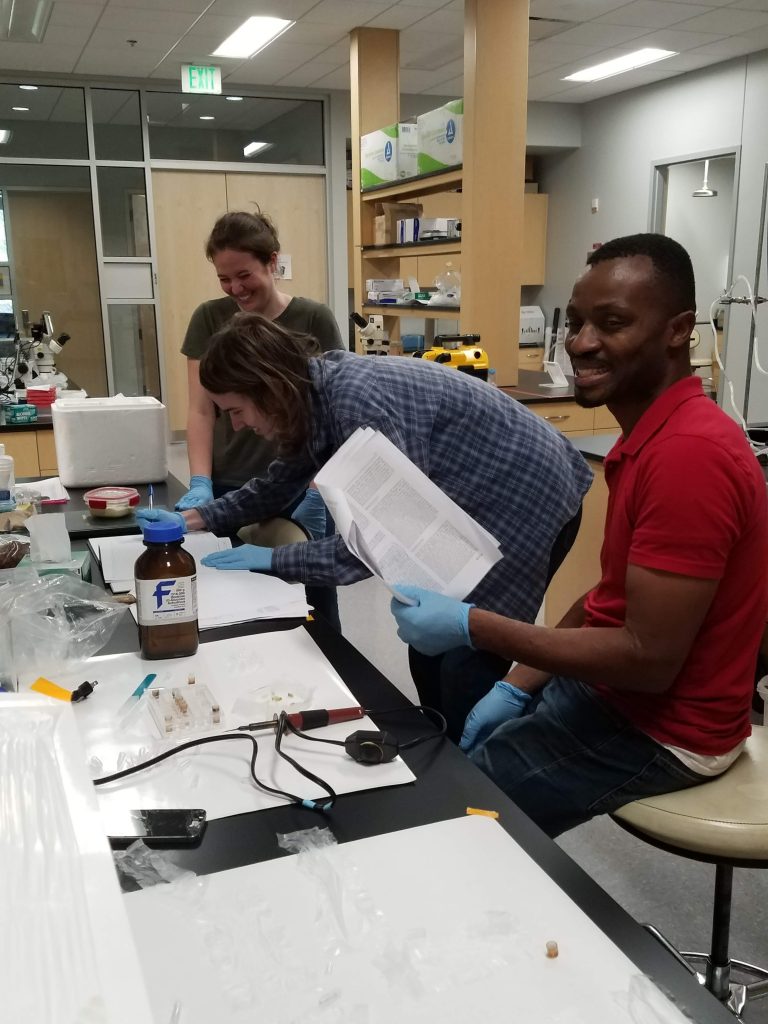

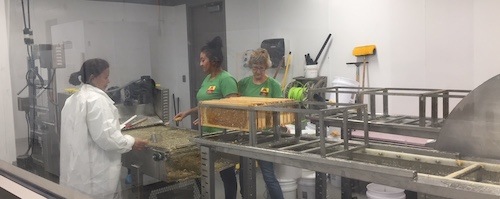
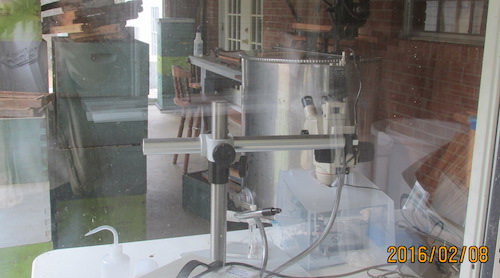
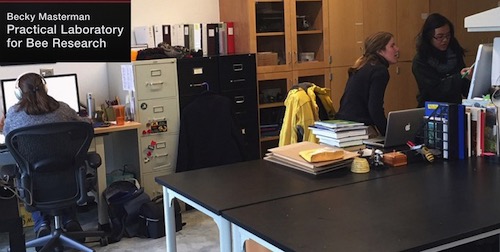
2019-2020 GAP Forms Available
The latest revision for the Golden Achievement Program rules and forms are now published and available for download at https://www.ncbeekeepers.org/chapters/gap,
The Golden Achievement Program (GAP) is intended to be high recognition of the efforts of a chapter and its members to advancing the practice, science and community of beekeeping through the year. Sharing the accomplishments of our chapters is the key to strengthening our NCSBA organization.
McGrady introduces House Bill 334 in support of NCSU Field Honey Bee Laboratory
The replacement of the field laboratory at the NCSU Lake Wheeler research facility has been a major priority for the North Carolina State Beekeepers for several years.
Rep. Chuck McGrady has introduced House Bill 334 which will provide funding for a new NCSU Field Honey Bee Laboratory.
You may read the text of the bill along with other official information at https://www.ncleg.gov/BillLookup/2019/h334.
Dr. David Tarpy has done outstanding work during the past decade as the leading apicultural scientist at NCSU, despite the limitation of inadequate facilities at the field lab. The uninsulated building is a post WWII residence which does not meet current building code standards. The roof sags and often leaks. Work space is inefficiently designed and not sufficient for the tasks at hand.
You can help advance this important effort by doing two things.
- First, call your local General Assembly Representative and Senator to tell them of the urgency of this need and your support.
- Second, Wednesday, March 20 is Ag Day at the North Carolina General Assembly. If you can do so, we ask that you come to the General Assembly to participate in this event and meet your Representative and Senator and make the case for this bill face to face.
With annual honey bee losses averaging 40 percent over the past few years –they were 50 percent last year– it is time to address this need. Vital research is needed to identify solutions to these excessive honey bee losses. NCSU has a great research program under the leadership of Dr. Tarpy and his staff. It can be better with a better facility.
We ask for your support.
Paul Newbold, President NCSBA
2019 Summer Meeting
The 2019 Summer Meeting of the NCSBA will be held in Hickory, NC, on August 8-10, 2019.
Pollinator Garden Design Application in the Works
A new garden design tool being developed at NCSU will be a valuable resource for beekeepers, gardeners and wildlife advocates. With students at NC State, Assistant Professor of Applied Ecology Dr. Elsa Youngsteadt is developing an online tool for designing and visualizing pollinator gardens.

Dr. Youngsteadt’s research and outreach deal with the ecology and health of pollinators in urban environments. She says, “I have noticed that a barrier for homeowners who want to create pollinator habitat is their discomfort with the garden design process, particularly when faced with lists of pollinator-friendly plants that may not be traditional ornamentals.”
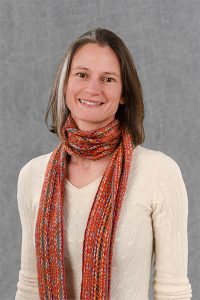
To overcome this barrier, Youngsteadt is working with NCSU’s computer science students to develop an online garden-design tool, driven by a database of recommended pollinator plants for North Carolina. The app will allow users to design a garden, see how it would look, check for recommended design features, and make adjustments prior to real-world installation.
Beyond its pollinator-friendly plant palette and the ability to show the garden in side view AND layout view, the application will also generate reminders if a planned garden doesn’t meet recommendations such as having variety in flower colors and shapes in each season.
This fall, the software project made the cut for development in the Senior Design Center capstone course at NC State. Youngsteadt says,the basic application will be free. Users will need to create an account. “To support maintenance costs, we might add premium features in the future, but the core functionality will be available to everyone.”
To find out more about the design app, visit Dr. Youngsteadt’s website, http://youngsteadtlab.org/index.php/extension/pollinator-garden-planner/. To help with future usability testing of her garden design application or to invite her to talk with your chapter about her urban pollinator research, email Youngsteadt at ekyoungs@ncsu.edu.
2019 Spring Meeting Hotels
The following hotels have agreed to give special rates for those attending the NCSBA/SCBA Joint Spring Meeting [Read more…] about 2019 Spring Meeting Hotels
2019 Spring Meeting Tentative Schedule
2019 Born & Bred Workshops Announced
Two workshops are available this spring from the Born & Bred Queen Rearing Program. [Read more…] about 2019 Born & Bred Workshops Announced
Spring Meeting Registration Open
Register Now!
Registration is now open for the Joint NCSBA/SCBA Spring Meeting in Monroe, NC, March 1-2, 2019.
Advanced registration saves you $10, reduces the time you spend standing in line, and reduces the number of headaches suffered by those running the conference. Your bees know to get things done without lallygagging about; follow their example!
Updates on 2019 Spring Meeting
The NCSBA spring meeting will be held March 1 and 2 (Friday and Saturday) at the Union County Cooperative Extension Center located near Monroe, NC. [Read more…] about Updates on 2019 Spring Meeting
Spring MBP testing announced
SPRING TESTING FOR THE MASTER BEEKEEPER PROGRAM April 27, 2019
McGrady Discusses Honey Bees on Local News
In Focus, a news show produced by Spectrum News, broadcast two segments at the end of November of interest to beekeepers. [Read more…] about McGrady Discusses Honey Bees on Local News
Honey Bee Health Workshop for Veterinarians in Monroe, Laurinburg
Two free, identical workshops will be held in North Carolina for Veterinarians.
[Read more…] about Honey Bee Health Workshop for Veterinarians in Monroe, Laurinburg
